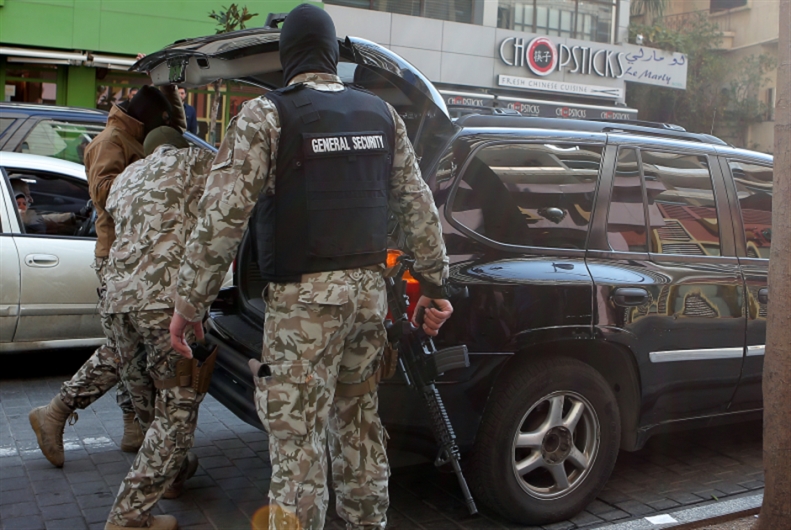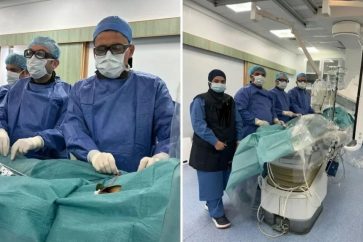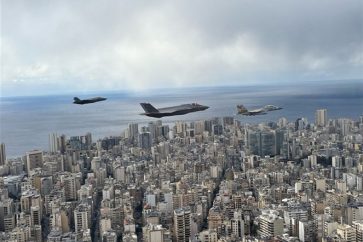Ibrahim Al-Amin
Translated by Areej Fatima Al-Husseini
The Israeli enemy seems to be under intense pressure, particularly in terms of strategic security, forcing it to conduct operations that do not represent the professionalism it once displayed. Their failure to achieve several goals in past years prompted them to begin point-scoring operations.
The most recent confrontations that mirrored the enemy’s weakness were depicted in Israeli intelligence soliciting the assistance of foreign individuals, who were recruited in exchange for money and dispatched to Lebanon to carry out acts against the Islamic resistance… However, the Resistance (Hezbollah) security service had been awaiting them and had worked diligently to track them until the very last moment.
This is what transpired in the case of the Russian national, who was captured by Lebanese General Security as he attempted to flee Lebanon after failing to meet a goal set by his Israeli employers.
Al-Akhbar’s Narration
According to the Lebanese daily, Al-Akhbar, the Russian citizen arrived in Lebanon roughly a month ago with a Russian woman and a seven-month-old baby.
He stayed in a hotel in the Lebanese capital, Beirut, before heading to its southern suburb (Dahiyeh), specifically to one of the neighborhoods. Thereupon, the resistance security apparatus, which was monitoring him, realized he was attempting to locate one of the resistance’s offices. However, these security body did not instantly arrest him, instead allowing him to carry out his mission to figure out the purpose for which he came.
The decision to head to the Dahiyeh was based on the timing set by the enemy during Ashura days, as it seems that the enemy assumed that part of Hezbollah offices would be evacuated during certain hours in line with the Ashura condolence ceremonies.
The Russian spy used coordinates provided by his operators to easily and accurately reach the target location. He tried to open the facility’s door, only to realize that there was another door that he couldn’t open, so he returned to his residence.
After he failed to achieve his goal, the resistance command realized there was a gap which had to be filled, prompting it to swiftly cooperate with the General Security service to arrest the Russian agent.
Hezbollah provided the General Security with a photo of the Russian man as well as data affirming that he was in Lebanon to carry out security operations against the resistance. As a result, the General Security command assigned a team of officers to the mission, and after examining the data for arrivals at Beirut International Airport, his photo was used to identify his passport.
After devising a security plan, the General Security officials at the airport were able to stop him, along with the accompanying woman and the baby, as they attempted to proceed to the plane’s door.
“The Israeli enemy recruited the Russian man via the Internet and provided him with coordinates and addresses in Dahiyeh“
Investigations Begin
After the detainees were transferred to a General Security station, investigations and checks of the man’s documents commenced. At first, the nature of the relationship between the man and the woman was ambiguous, but it was proven to the investigators that he accompanied her along with the baby to cover up his activities and ward off suspicions about him. During the first ten days of the investigation, the Russian spy maintained his denials, confirming that he was wandering around typically, that he may have made a mistake in approaching some locations, and that he had no knowledge of Hezbollah’s presence therein.
During the initial investigation, the woman denied knowing anything and kept repeating what the man claimed. At that point, the investigators altered the course of the investigation, telling the woman that the information was certain and that her silence meant she was complicit in the crime the man was committing. The investigators also told the woman that more severe sentences would be issued against her as a result of her silence, and that she would be separated from the baby, who would end up in a child care center. All of these threats frightened her, as she acknowledged her awareness of what the man was doing and that this was not his first visit to Lebanon.
The women went on to say that the man had previously visited Beirut in 2021 and 2022, but this was the first time she had joined him. In addition, she had no idea what he was doing, but she watched him after they arrived in Beirut and saw him spending a full day in the hotel training to unlock particular types of locks without making noise.
Confession and Recruitment
When the investigators presented the Russian spy with the new evidence as well as other material, he confirmed that he had traveled to Lebanon on a specific mission, denying his knowledge of the identity of the operator and confirming the following:
First, he is a Russian citizen who works in the industry of locks, and he presents his CV and services on social media.
Second, he received letters from anonymous parties offering him a job. Then he called the unknown party and accepted the offer of a job in a mission comparable to his profession in exchange for money.
Third, he was requested to visit Beirut for the first time in 2021 to photograph several locations in the city’s southern suburb (Dahiyeh). He claimed that he had no idea it belonged to Hezbollah and that whoever assigned him the duty had not informed him that the problem was tied to the Lebanese resistance party.
Fourth, he revisited Lebanon in 2022 and was asked to head to a commercial facility to ensure that there was an electric generator and a bulldozer. He was requested to set the generator on fire and move out of the location. However, after discovering the existence of security systems and surveillance cameras, he informed his operators that the mission was impossible.
Fifth, before traveling, the operator used to provide him with a sum of money, which he would receive via transfers. He was also guaranteed a significant reward if he fulfilled the task that had been set on his previous visits.
Enter the Facility and Contact Us
Concerning this mission at particular (the fourth and the fifth points), the Russian detainee stated that his operators provided him with information about the location he was supposed to head toward and set the timing for him. They also showed him photographs of several types of locks and instructed him to try unlocking them in a specific way in a short period of time.
He had to contact them after entering the facility using a phone he had already been provided with so that the operators could notify him of the next step. He stressed that he had no idea about the content of this location and had no notion of what was required of him.
The detainee narrated how he headed to the Dahiyeh and used the coordinates he had to reach there. After confirming the accuracy of the address, he walked to the closed door and began the process of unlocking it using special tools. However, he encountered difficulty, which required him to spend about an hour before he succeeded in opening the door. He was surprised to see that the door led him to another door, so he began scrutinizing it and examining the type of lock on the second door before attempting to open it. Yet he then heard some voices close to him, which confused him, and thus he acted as if he would be caught.
He gathered his belongings and exited the premises, catching a taxi back to his hotel. There, he collected his things and decided to flee the Lebanese territories. Ironically, he had no idea that the General Security agents were monitoring him, verifying his name and passport, and waiting for him at the passport checkpoint, where he was arrested before boarding his flight back to Russia.
“Lebanese General Security identified him through the arrivals data list and stopped him before he boarded the plane“
The Dumping Strategy
In the same context, insiders close to the counter-espionage investigation warned of the Israeli enemy’s “dumping strategy.” Direct examinations of those who were contacted, either directly by the enemy or through unknown and suspicious parties, reveal that hundreds of people were recruited by the enemy’s intelligence agencies.
When the government security agencies, as well as the resistance security apparatus, extended their pursuit of these individuals, it became obvious that the enemy had chosen a policy aimed at achieving several goals:
The Israeli enemy intends to provide the largest human coverage for their security work in Lebanon. Thus, the Israeli enemy shifted from the stage of meticulous selection, intense training, and being sure of the agent’s capacity to accomplish the mission to the stage of random selection from a sample from which they choose what is suitable for them. In the past five years, the Israeli enemy has relied on social media or job application centers to communicate with a large number of youths whom it sees as ready for adventure and seeking to obtain work or money.
Later, the enemy focused on a group that could gain access to the environment, and workplaces of the resistance, whether through people it could hire directly in Lebanon or through those who went abroad in search of work with a high financial return. The Israeli enemy also concentrated on people who live in the resistance’s regions or are relatives to members or officials of the party, as well as several youngsters who had previously participated in resistance activities in Lebanon or Syria.
However, the Israeli enemy’s randomness no longer gives value to the spy himself, as investigations and confessions demonstrate that the sums allotted to these individuals are quite minor in comparison to what the enemy previously did, in addition to assigning them other tasks such as training, testing, and gathering vital and direct information on the ground.
Nevertheless, there are signs of tension in the enemy’s management of this file, especially as it became evident gradually that the team confronting the enemy’s programs now has an adequate grasp of its operating strategy.
Resistance and Lebanese Security Forces on the same page
The enemy has repeatedly noticed that the resistance or the Lebanese security services are working to re-employ some agents or to benefit from them in gathering data connected to the operator or even in widespread deception operations.
Although each of these bodies has its own specificity and method of working to confront Israeli espionage, it appears that coordination between the resistance and the official security forces has reached a high level, especially since the enemy’s work won’t cease, nor will the efforts of the forces countering it in Lebanon.
Yuri, Lilia, and Sofia
Yuri Rinatovich Chaykin, the Russian agent, was born on March 13, 1977. He holds a Russian passport with the number 788232809, dated July 26, 2022, and valid for ten years.
The woman accompanying Yuri is Lilia Alexandrovia Chaykin, born on August 3, 1979. She holds a passport issued by Russian authorities No. 770535099 on June 16, 2023, and is valid for ten years. As for the baby, Sofia Yuryevna Chaykin, born on January 7, 2023, holds a passport issued by Russian authorities No. 770512324 on June 7, 2023, and is valid for ten years.
The Lebanese General Security Service contacted the Russian Embassy in Beirut, which confirmed the legitimacy of the documents in the detainees’ possession. Furthermore, an embassy representative is following up on the probe and is working hard to free the woman and baby and allow them to depart Lebanon for Moscow. General Security informed the Russian embassy that it is awaiting the finalization of some information before determining that the woman had no role in the mission of the agent who will be tried in Lebanon.
*Ibrahim Al-Amin is Al-Akhbar Lebanese newspaper’s CEO. This article was published by the daily on Monday, August 28, 2023.
Source: Al-Akhbar Newspaper




